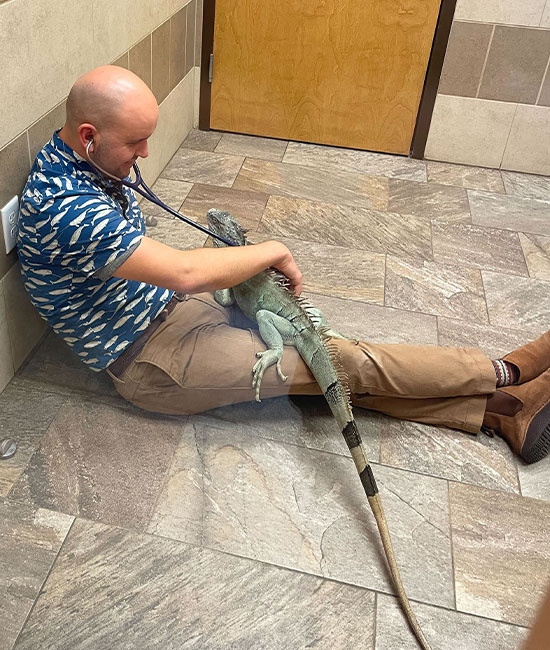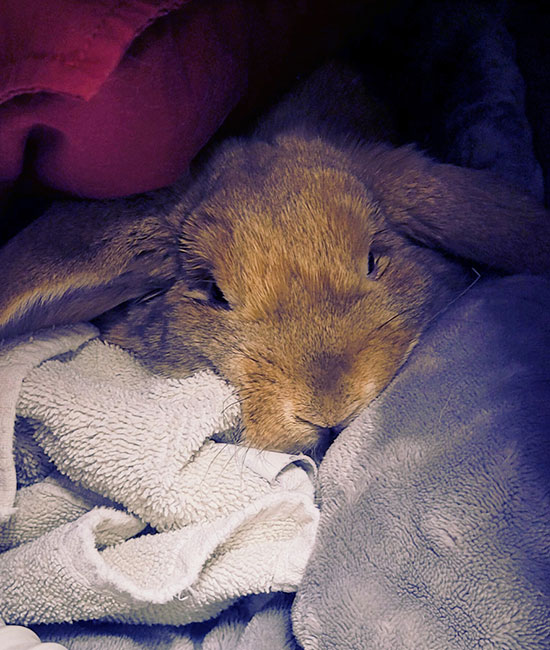
Love Knows No Size
Veterinary care for exotic and pocket pets.



When your reptile or small mammal needs an annual examination, vaccines, or treatment for an illness or wound, we can help you understand what your pet needs and what we can do to help.

Exotic and Pocket Pet Services
We have the experience, training, and technology to meet the unique needs of your exotic pet. We are proud to offer exotic pet services including:
Annual Examinations

When you bring your exotic pet to an exotic pet vet, you can expect:
- Assessment of your pet’s condition
- Administration of vaccinations and necessary medications
- Discussion about your exotic pet’s nutritional needs
- Husbandry consultation
- Pet grooming and nail trims
Illness Examinations

- Comprehensive exam of all body systems
- Diagnostic imaging including x-ray and ultrasound
- Blood work
- Medical treatment
Spay & Neuter

Minor Grooming

Qualifications as Exotic Pet Vets
All veterinarians are trained to treat all species and types of animals in veterinary school. However, not every veterinarian chooses to treat ALL animals. Some limit their practices to domestic animals like dogs and cats. Others limit themselves to farm animals.
Veterinarians who truly want to treat exotic pets receive additional training in treating non-domestic animals. In the event that your pet needs additional care we can refer you to a board-certified exotic specialist (ABVP or ACZM). While there are less than 300 of these in the world, we are lucky to have resources at Colorado State University in Fort Collins. We have the experience and, most importantly, the passion to help all animals, regardless of species. When you bring your pet to Parker Center Animal Clinic, you can expect your vet to be dedicated to your exotic pet’s health.
Fun Facts
- Guinea pigs require a high level of vitamin C and can get scurvy if it is lacking in their diet.
- Rodents have teeth that continuously grow and if not fed enough roughage, these teeth will not wear down properly and can cause mouth sores and even an inability to close their mouth.
- Pets housed on cedar or pine shavings can develop pneumonia due to the volatile oils in the wood.
- Reptiles need varying degrees of humidity. Those that naturally live in very humid places will not shed properly if their enclosures are too dry. Toes can even be lost due to improper shedding!
- UV light is important for metabolism and reptiles often develop a syndrome called Metabolic Bone Disease without proper UV exposure.
- Some birds (mainly the parrot type birds) need lots of companionship and mental stimulation or may resort to self-mutilation out of boredom or frustration. Other birds get extremely stressed and can even pass away from handling.
- It can be difficult to determine how plump a chicken is due to their pronounced pectoral muscles and fluffy feathers, but pet chickens are commonly obese and can be predisposed to developing bumblefoot because of this.
- Poor nutrition or even a slight calcium imbalance can case egg binding in pet birds.
For reasons like these, it is even more important to have annual evaluation for these small pets as it is for dogs and cats. A husbandry consultation is part of the annual evaluation for every exotic pet because, as stated above, the conditions should be near what they pet would encounter in the wild and this can be very difficult to achieve. Sometimes husbandry is not enough and additional measures should be taken, for example, even if rodents have adequate roughage, dental maintenance and treatment are often still needed.
Exotics specialists are veterinarians who have undergone years of additional training and testing in order to call themselves a diplomat of the American Board of Veterinary Practitioners (avian or exotics field) or the American College of Zoological Medicine. They use the abbreviations ABVP or ACZM in their name. There are less than 300 of these individuals in the world. Many of these specialists work in academic settings or zoos and don’t provide services to the general public. If you are interested in seeing an “expert”, there is one of these specialists at Colorado State University in Fort Collins.
All veterinarians are licensed to treats all species of animals (except humans of course!). So why is it so hard to find a vet who is willing to see a pet gecko? Most veterinarians place limitations on themselves in order to be more adept at treating a few species because it is extremely difficult to become an expert in treating dozens of species. Some veterinarians only see horses and cows, a majority wish to see only dogs and cats, and very few see only exotic species.
The veterinarians at PCAC typically see dogs and cats, but Dr. Starnes will also see exotic pets. He cares about their well-being so much that he will always tell people that he would love the opportunity to see their exotic pet, but in the same breath tell them about exotic pet specialists if their friends need extra care. Often, because most of these critters are prey species, by the time your little friend is displaying signs of illness they are very sick and may need extra care.
Fun Facts
- Guinea pigs require a high level of vitamin C and can get scurvy if it is lacking in their diet.
- Rodents have teeth that continuously grow and if not fed enough roughage, these teeth will not wear down properly and can cause mouth sores and even an inability to close their mouth.
- Pets housed on cedar or pine shavings can develop pneumonia due to the volatile oils in the wood.
- Reptiles need varying degrees of humidity. Those that naturally live in very humid places will not shed properly if their enclosures are too dry. Toes can even be lost due to improper shedding!
- UV light is important for metabolism and reptiles often develop a syndrome called Metabolic Bone Disease without proper UV exposure.
- Some birds (mainly the parrot type birds) need lots of companionship and mental stimulation or may resort to self-mutilation out of boredom or frustration. Other birds get extremely stressed and can even pass away from handling.
- It can be difficult to determine how plump a chicken is due to their pronounced pectoral muscles and fluffy feathers, but pet chickens are commonly obese and can be predisposed to developing bumblefoot because of this.
- Poor nutrition or even a slight calcium imbalance can case egg binding in pet birds.
For reasons like these, it is even more important to have annual evaluation for these small pets as it is for dogs and cats. A husbandry consultation is part of the annual evaluation for every exotic pet because, as stated above, the conditions should be near what they pet would encounter in the wild and this can be very difficult to achieve. Sometimes husbandry is not enough and additional measures should be taken, for example, even if rodents have adequate roughage, dental maintenance and treatment are often still needed.
Exotics specialists are veterinarians who have undergone years of additional training and testing in order to call themselves a diplomat of the American Board of Veterinary Practitioners (avian or exotics field) or the American College of Zoological Medicine. They use the abbreviations ABVP or ACZM in their name. There are less than 300 of these individuals in the world. Many of these specialists work in academic settings or zoos and don’t provide services to the general public. If you are interested in seeing an “expert”, there is one of these specialists at Colorado State University in Fort Collins.
All veterinarians are licensed to treats all species of animals (except humans of course!). So why is it so hard to find a vet who is willing to see a pet gecko? Most veterinarians place limitations on themselves in order to be more adept at treating a few species because it is extremely difficult to become an expert in treating dozens of species. Some veterinarians only see horses and cows, a majority wish to see only dogs and cats, and very few see only exotic species.
The veterinarians at PCAC typically see dogs and cats, but Dr. Starnes will also see exotic pets. He cares about their well-being so much that he will always tell people that he would love the opportunity to see their exotic pet, but in the same breath tell them about exotic pet specialists if their friends need extra care. Often, because most of these critters are prey species, by the time your little friend is displaying signs of illness they are very sick and may need extra care.

